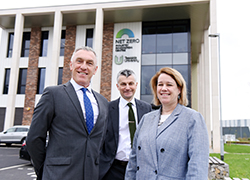Teesside expertise to help construction in Middle East
A Teesside University world leading authority on construction research and innovation has teamed up with a Middle East university and a multi-national construction technology company to cut costs and raise efficiency in the construction industry in the Gulf.
Teesside University, Qatar University and service provider Hochtief ViCon has organised a series of non-profit events to raise the knowledge base for the applications of Building Information Modelling (BIM).
Professor Nashwan Dawood, director of Teesside University’s Technology Futures research institute, is part of the bid to develop a knowledge hub for BIM in the Middle East and improve the Gulf construction industry – centred on Qatar.
The events are seen as particularly important to the Qatar construction market and 3D Building information Modelling is a hot topic as preparations begin now for the run up to the 2022 world cup in Qatar – the first Arab state to host the tournament. According to financial analysts up to £138 billion could be spent on stadiums, facilities and transport infrastructure.
BIM creates 3D models which allow live up to date information which has multipurpose functions such as tracking cost, time, use of material and execution space utilisation to support planning tasks, co-ordinate designs and visualise complex designs.
The software tools can be applied to most projects ranging from infrastructure to stadia. Professor Dawood’s team collaborate with teams all over the world and the tool has been used to rehearse builds on major building projects including bridges and gas rigs.
Professor Dawood explains: 'One of the problems there has always been in construction is the element of having to ‘suck it and see’. You start to do the work and then suddenly there are a lot of problems. Now we can simulate the processes in advance on a computer screen in 3D, work out how things are going to be done and communicate this with the supply chain.'
Professor Dawood estimates this can save around 5-7% off projects and help contractors ensure they deliver to deadline. 'You can virtually iron out problems before they happen. It increases the confidence of clients and therefore increases investment. BIM is effective for managing construction projects during their entire lifecycle.'
There will be a further three events in Qatar over the next 12 months based on what Professor Dawood explains are the four pivotal components necessary for the successful use of 3D modelling for construction: processes, people, technology and policy.
Professor Dawood says: 'These events are taking place at what is recognised as the fastest period of expansion in Qatar. It will be exciting to see how much BIM can save in time, energy and money.'
Professor Dawood is also bidding for Qatar Foundation, Qatar National Priority Research funds to support the BIM initiative in Qatar. This is in conjunction with Qatar University and Hochtief-VICON.
 Supporting Nigerian farmers by transforming food waste into
...
Supporting Nigerian farmers by transforming food waste into
... International partnership signed with prestigious American
...
International partnership signed with prestigious American
... Teesside University academics join prestigious network of
...
Teesside University academics join prestigious network of
...